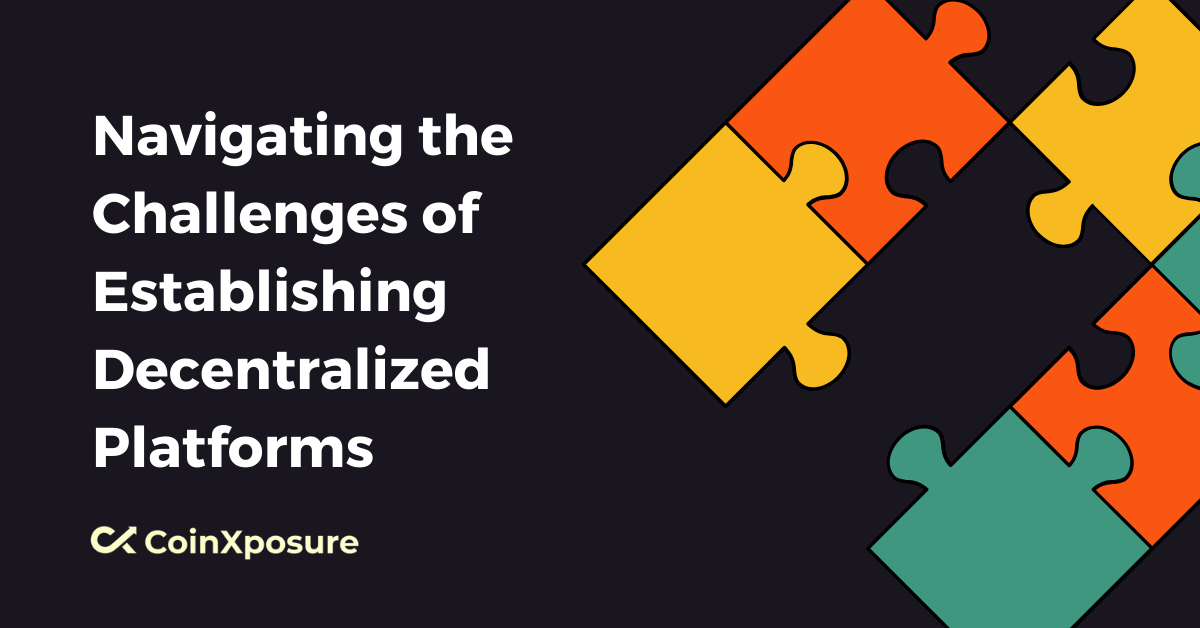
Navigating the Challenges of Establishing Decentralized Platforms
DeFi is revolutionizing the banking system globally. This article looks at the challenges of establishing decentralized platforms.
Decentralization in blockchain means moving power and decision-making from a central body (like a person, an organization, or a group of organizations) to a distributed network.
Decentralized networks try to make it so that participants don’t have to trust each other as much and can’t use their power or control over each other in ways that hurt the network’s usefulness.
The idea of decentralization has been introduced previously. Three main types of network design are usually thought about when making a technology solution: centralized, distributed, and decentralized.
Decentralizing how resources are managed and how people can access them in an app can lead to better and more fair service.
There are some downsides to decentralization, like slower transaction throughput. But these downsides should be worth it for better security and service levels.
What are Decentralized Platforms?
A decentralized platform or application, or dApp, is a piece of digital software that works in a network of separate nodes with no organization in charge.
People could share files over DApps like Napster did in the past. But on many new Web3 sites, copies of the network software are on millions of computers and other devices that people own.
These dApp networks don’t break easily. The more a node tries to control a group, the harder it will work to keep itself safe.
New decentralized apps (dApps) are coming out to compete with the big tech platforms already out there. Finance (DeFi) and games are leading the way.
DeMe (Decentralized Media) apps for social media are just now starting to show up.
Understanding Decentralized Platforms
A peer-to-peer network or a blockchain network can be used to run a DApp. BitTorrent, Tor, and Popcorn Time are all programs that can be used on computers connected to a P2P network.
This type of networking lets many people use content, feed, or spread content. dApps run on a blockchain network in a public, open-source, decentralized space where no one power can control or mess with them.
A developer could make a dApp that works like X and put it on a blockchain so anyone can post comments.
Once the texts are posted, they can’t be taken down, not even those who made the app.
Benefits of Decentralized Platforms
Decentralized platforms have several benefits. Some of them are;
- Decentralization
- Transparency
- Freedom of expression
- Privacy
- Incentivization
Decentralization
Decentralized content sites help make the internet more democratic and open by eliminating the need for a central authority.
People who create content have more power over it, and people who use it can get more information.
Transparency
Blockchain technology makes sure that all deals are clear and safe. This ensures that creators get paid fairly for their work and gives users confidence that the material they view is real.
Freedom of Expression
Some people don’t like how centralized content platforms censor material. Freedom of speech is a top priority on decentralized content sites, which lets a broader range of voices be heard.
Privacy
People who use blockchain technology also have more private lives. There is no central server where personal information is kept. This lowers the risk of data breaches and gives users more power over their data.
Incentivization
Many decentralized content sites have their cryptocurrency, which lets creators be encouraged by giving them rewards for their work. This makes a model for creating and sharing material that can last longer.
Challenges of Establishing Decentralized Platforms
DeFi has the potential to revolutionize the financial sector, but there are still many challenges that must be addressed first.
The fact that it is mainly unregulated makes it a magnet for fraud and money laundering and lacks consumer safeguards in traditional finance.
Some of the challenges of decentralized platforms include;
- Tax collection difficulties
- DeFi doesn’t provide a level playing ground
- Governance issues plages the sector
- Global regulatory coordination
Tax Collection Difficulties
Digital currency transactions are taxed, but the researchers say it takes a lot of work to report them, even for good intentions, because DeFi is mainly based on permissionless and anonymous blockchains.
Barclays even says that the IRS might miss out on $50 billion a year in unpaid crypto taxes because it’s hard to track crypto trades and collect taxes.
“It’s hard to collect taxes in the DeFi world.” “There aren’t any middlemen with the tools to make sure you pay your taxes, prove who you are, and then send a 1088 tax form or a capital gains notification to the IRS.
A person who wants to do the right thing might find it hard. One day, there might be tools that can figure out a person’s crypto tax.
This can help people who want to file their taxes. Taxes on Crypto are easy to avoid, though, “giving one part of the financial sector a huge subsidy over the traditional financial sector where we do collect taxes.”
DeFi doesn’t Provide a Level Playing Ground
It is pretty naive to believe” that DeFi will automatically level the playing field, even though it says it will make access more open to everyone.
Economies of scale and scope will always happen in financial markets, along with big network externalities.
Even if there is a free market entry, these forces push for concentration.
Because liquidity is vital for exchanges, for example, traders will always try to fulfill their order on the exchange with the most profound and liquid market.
However, this lets the exchange charge large fees. “There are signs of the same thing happening in DeFi markets.” Top platforms charge high fees and work hard to keep their top spot in the market.
As the fight between Uniswap and SushiSwap shows, even in the world of DeFi, the big swaps try to keep their trade secrets from other people so that they can’t compete as well.
Governance Issues Plagues the Sector
DeFi governance is different from traditional finance because it uses decentralized autonomous groups. Like a crypto co-op, a DAO gives everyone who wants to make decisions a say.
This is done by letting a group of users vote on proposals using crypto tokens.
But that setup can still have the same control problems that the crypto space has had.
For instance, the first DAO, called “The DAO,” raised more than $150 million but had many problems with its governing and was later taken off the market.
The writers also said that because blockchain is anonymous, it would be hard to punish owners with big stakes (called “blockholders”) if they got enough power to make the system do what they wanted.
“There has been little evidence so far to suggest that the crypto space can successfully resolve governance issues without relying on some off-chain mechanisms,” the authors write.
“Off-chain” means that the problems are not in the blockchain itself.
“Since the governance problems of blockchain platforms and traditional financial firms are not that different, strong governance systems will likely need help from outside regulators,” they write.
Global Regulatory Coordination
Different countries have different rules about cryptocurrency and DeFi, but theft could be reduced by making it easier for regulators worldwide to work together.
“Regulations are being worked on in different ways in Europe and the U.S., and I think Europe is further along than the U.S.”
“Part of the reason for this is that there are so many possible crypto regulators in the U.S. who need to work together.” That makes it hard to work together and also leads to turf wars.
The DeFi system can be regulated in a way that keeps most of the benefits of blockchain design while also promoting accountability and following the rules.
Validators on the blockchain might have to check that an address belongs to a certified organization, and they would only be able to process transactions that involve certified addresses.
Schoar pushed for building a system that lets decentralized groups work together with authorities.
That could ensure that people who follow the rules for anti-money laundering, know your client, and fight terrorism are the only ones who can add events to the blockchain.
By doing this, “We could make sure that the blockchain eco-system adheres to these basic standards, at least for the majority of citizens of countries like the U.S. or Europe that agree on these standards,” she said.
It’s possible to keep most of that design while keeping our economy safe from illegal activities like tax evasion if we can work together well.
Final Thoughts
Decentralized platforms, or dApps, are computer programs or apps that run on a decentralized network instead of a single computer or server.
They could revolutionize traditional industries by letting people connect and do business with each other without a central authority.





